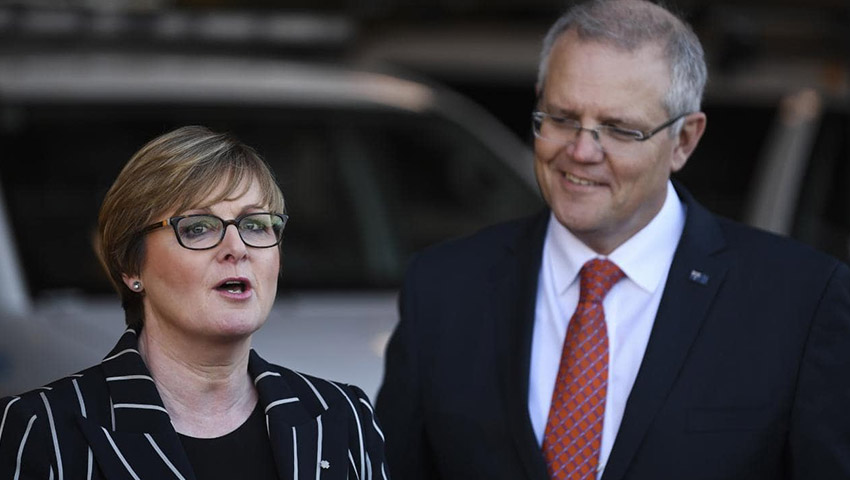New Defence Minister Linda Reynolds has used an address to the ASPI International Conference: War in 2025 to reaffirm Australia’s commitment to maintaining the ‘rules based order’, while recognising the role Australia must play in preventing future conflagration.
To continue reading the rest of this article, please log in.
Create free account to get unlimited news articles and more!
"Less than two weeks ago, two days after being sworn in, I attended the Shangri-La Dialogue in Singapore. What struck me there was a deepening sense of anxiety about the region’s future," Minister Reynolds stated in the opening statement of her address to the ASPI International Conference: War in 2025, setting the tone the address.
Minister Reynolds placed significant focus on the changing economic, political and geo-strategic environment in the Indo-Pacific with the ongoing economic and strategic competition between the US and China serving as the primary driver of anxiety in the region.
Additionally, China's active militarisation of reclaimed islands in the South China Sea (SCS) and further territorial antagonism, North Korea's continuing pursuit of a credible nuclear arsenal and the enduring threat of asymmetric threats including extremist groups, cyber security threats and organised crime, are all serving to compound regional affairs.
Minister Reynolds took the opportunity to resolutely reaffirm the Australian government's commitment to economic liberalisation, regional partnerships and the maintenance of the rules based order, clearly defining what it means to Australia in the modern context:
- Actively upholding international law;
- Reinforcing, not undermining, the work of multilateral institutions;
- Acting responsibly and transparently in assisting other countries;
- Enforcing sanctions in response to rogue behavior;
- Not misusing technology under the cloak of deniability; and
- Punishing terrorists discriminately.
"Australia will always identify with rules-based systems and work actively to support them. This does not mean – and let me be clear about this – this does not mean that we want to preserve the past as a way of shaping the future, far from it. For rules are strengthened by being adapted to new realities. New rules also need to be written, especially in relation to potentially disruptive technologies that have advanced faster than have regulations governing their use," Minister Reynolds' address stated, reinforcing Australia's commitment to working with its regional partners to maintain and evolve the post-Second World War economic, political and strategic order.
Building on this, Minister Reynolds took the opportunity to reinforce Australia's understanding that the nation's hard power will form a critical role in supporting Australia's enduring commitment to securing the Indo-Pacific to the benefit of Australia's national interest and the broader security of the region.
"Decisions that, taken together, amount to a 10-year more than $200 billion investment in a more agile, capable and potent defence force. A defence force that will see the biggest regeneration of the Royal Australian Navy since the Second World War," she said.
"A defence force that is already transitioning to a fifth-generation Air Force. A defence force making new investments to deal with cyber and space threats and to significantly augment our intelligence and surveillance capabilities. A defence force that is more closely partnered with industry, and our universities and research institutions, to drive innovation generating greater capability."
Key components of Minister Reynolds' comments focused and reinforced the nation's commitment to supporting continuing counter-terrorism training and support operations in the southern Philippines, expanding the intelligence, surveillance and reconnaissance flights from Butterworth in Malaysia. Minister Reynolds also took the time to focus on the increasing threat of grey-zone tactics or hybrid warfare.
"What is clear now, is that the character of warfare is changing, with more options for pursuing strategic ends just below the threshold of traditional armed conflict – what some experts like to call grey-zone tactics or hybrid warfare. It is vital that we be able to bring all of our sources of national power to bear on this problem, not just those of Defence," she said.
Alliances will continue to play a pivotal role in Australia's engagement and enduring relationships with the Indo-Pacific – with the ANZUS treaty and long-term relationship with the US serving as the cornerstone for Australia's long-term national security.
"We are now in our second century of mateship with the US. That matters a great deal. Today this relationship is not just about our mutual support obligations, enshrined in the ANZUS treaty. Rather, it is about ensuring the alliance is more focused on, and responsive to, shared challenges in the Indo-Pacific," Minister Reynolds stated.
The ASPI International Conference: War in 2025 is a series of discussions about the key drivers that could lead to conflict in the next decade, how the relative power dynamics between the great powers are changing, multi-domain warfare now and in 2025, what technologies will shape future warfare, information operations, and the next Defence White Paper.

 Login
Login







